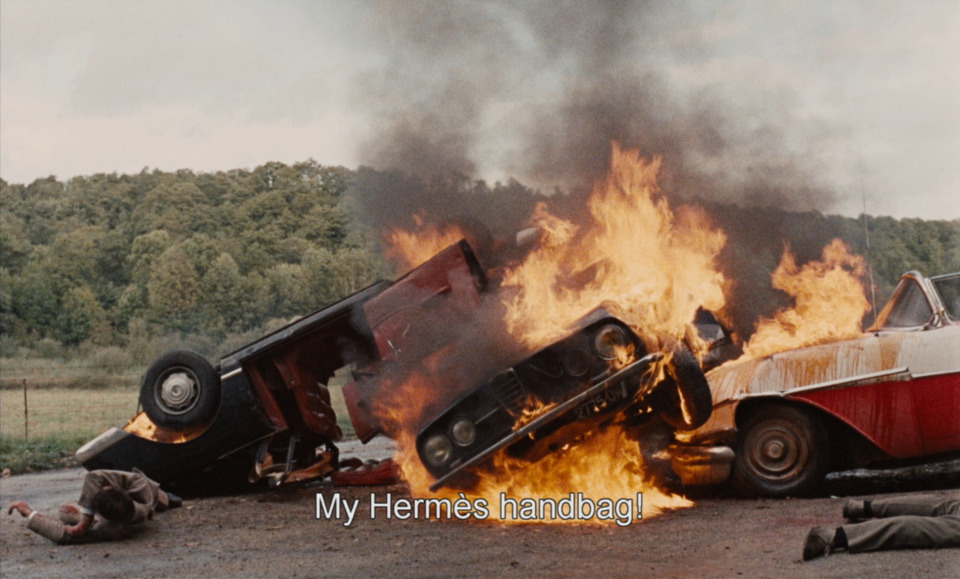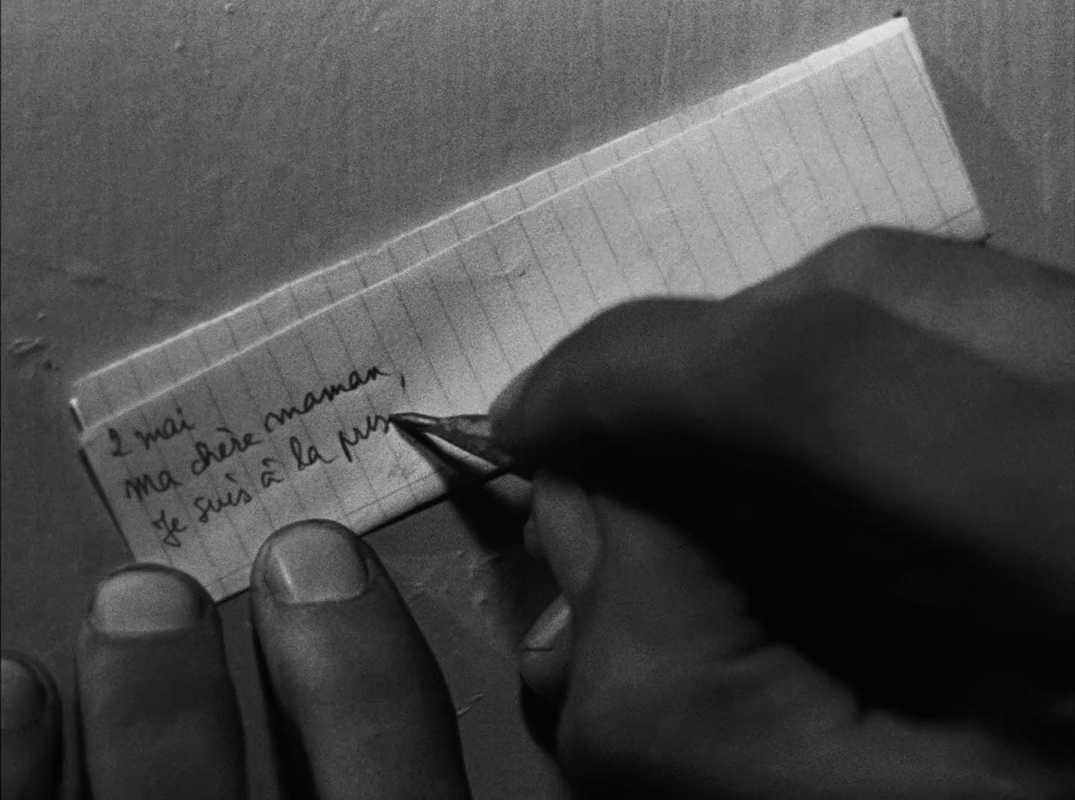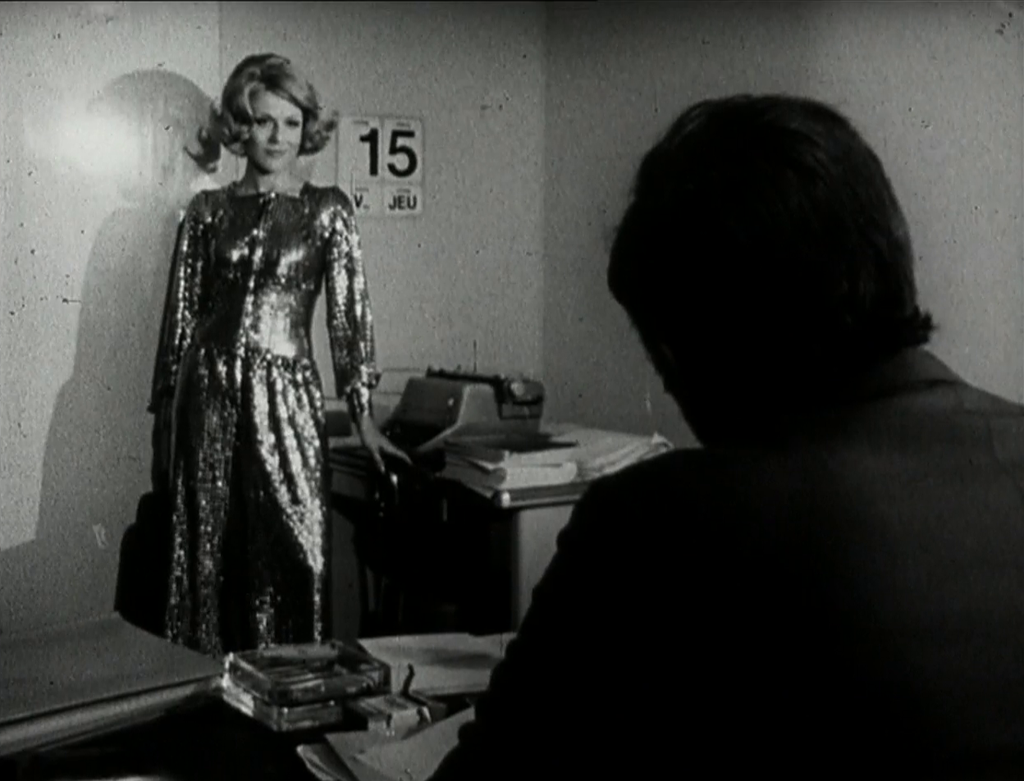Point de chute [Falling Point] (Robert Hossein, 1970)
Jun
4
Global Running Day

Catherine (Pascale Rivault) running. DP: Daniel Diot.
A character who is running on Global Running Day
France
Sombre (Philippe Grandrieux, 1998)
Jun
3
World Bicycle Day

Cycling fans along the route. DPs: Philippe Grandrieux & Sabine Lancelin.
A film scene with a bike for World Bicycle Day
Jean (Marc Barbé) follows the route of the Tour de France. He sees women, picks them up, takes them out. Claire, infatuated with him, is taken in by his darkness. At night, the cyclists continue the course.
“Soyez réalistes, demandez l'impossible”Grands soirs & petits matins [May Days] (William Klein, 1978)
May
24
1968

Sorbonne students discussing the political situation with an elderly Parisian man. DPs: William Klein & Bernard Lutic.
– May 68 slogan
“Hélène Picard, born in Lyon, May 20, 1943. A child in care, she is reported as a runaway, a thief and unstable.”La Femme Bourreau [A Woman Kills] (Jean-Denis Bonan, 1968)
May
20
1943

A dark-haired woman lounging on a bed. DP: Gérard de Battista.
Les félins [Joy House / The Love Cage] (René Clément, 1964)
May
14

Barbara Hill (Lola Albright) going through Marc Borel's (Alain Delon) passport, which states Marc's date of birth as May 14. On Barbara's desk several curiosities, including a shrunken head in a glass case. DP: Henri Decaë.
“My Hermès handbag!” Week-end (Jean-Luc Godard, 1967)
May
9
UN Global Road Safety Week

A terrible, bloody, car crash. There's cars on fire and several injured sprawled around. A lucky survivor exclaims MY HERMÈS HANDBAG! DP: Raoul Coutard.
A traffic accident: UN Global Road Safety Week *
– Corinne
The bourgeois make their way to the countryside, and find themselves in a cacophony of car crashes, primitive urges, and political uprisings.
* In 2025, this actually takes places from May 12 – 18.
“Producers are something I can easily do without”Le mépris [Contempt] (Jean-Luc Godard, 1963)
May
5
Europe Day

Michel Piccoli, director Fritz Lang, Jack Palance, and director Jean-Luc Godard behind the scenes. The clapperboard held by Godard is for the movie that Lang's working on in Le Mépris, an adaption of Homer's Odyssey. DP: Raoul Coutard.
A director from the EU for Europe Day
– Fritz Lang
A film in a film, the former directed by Fritz Lang, directed by Godard.
“With nothing to do, no news and in terrible solitude, we were 100 unfortunates awaiting our fate. I had no illusions about my own. If I could only escape, run away…”Un condamné à mort s'est échappé ou Le vent souffle où il veut [A Man Escaped] (Robert Bresson, 1956)
May
2

A hand with dirty nails writing on a scrap of paper with a pencil stump. It starts “Mai 2 Ma chère maman, Je suis à la pris[…]“. DP: Léonce-Henri Burel.
– Fontaine
“I had appealed to the people to fast on April 6, and the whole nation followed my call. Who was I? But it was the voice of God… India was awakened that day.”Vagabunden Karawane [Vagabond’s Band] (Werner Penzel, 1980)
Apr
16
હડતાળ

A member of Embryo plays a harmonium with a bemused साधु [sadhu] sitting behind him (still via). DPs: Pitt Koch & Helge Weindler.
A film set in India in remembrance of Gandhi's હડતાળ [hartal], a peaceful protest against the Jallianwala Bagh Massacre, in the form of a nationwide fast and prayer on April 16, 1919.
– Mahatma Gandhi, via
In 1979, krautrock group Embryo toured Iran, Afghanistan and India by bus, while performing with local musicians and documenting their trip.
